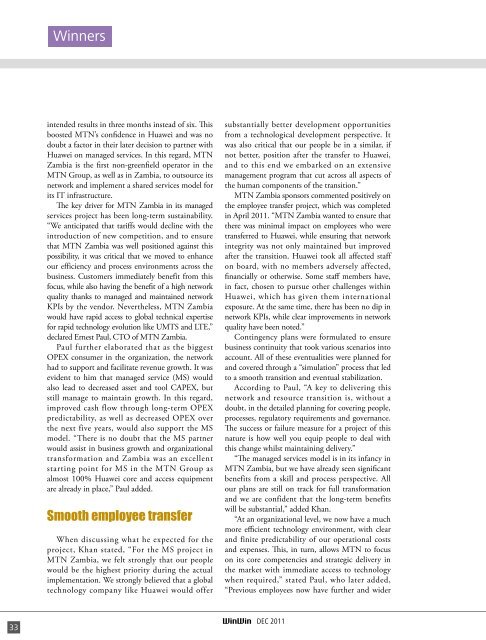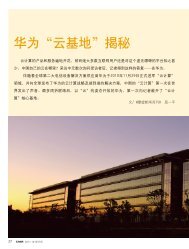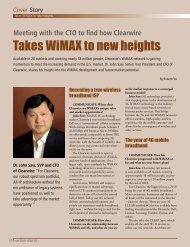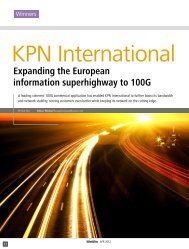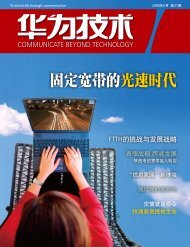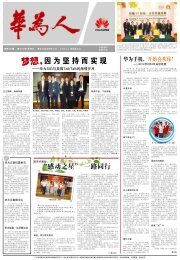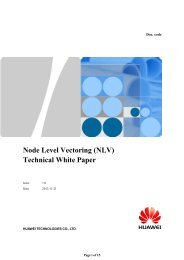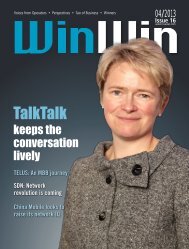Telekom Malaysia - Huawei
Telekom Malaysia - Huawei
Telekom Malaysia - Huawei
You also want an ePaper? Increase the reach of your titles
YUMPU automatically turns print PDFs into web optimized ePapers that Google loves.
Winners<br />
intended results in three months instead of six. This<br />
boosted MTN’s confidence in <strong>Huawei</strong> and was no<br />
doubt a factor in their later decision to partner with<br />
<strong>Huawei</strong> on managed services. In this regard, MTN<br />
Zambia is the first non-greenfield operator in the<br />
MTN Group, as well as in Zambia, to outsource its<br />
network and implement a shared services model for<br />
its IT infrastructure.<br />
The key driver for MTN Zambia in its managed<br />
services project has been long-term sustainability.<br />
“We anticipated that tariffs would decline with the<br />
introduction of new competition, and to ensure<br />
that MTN Zambia was well positioned against this<br />
possibility, it was critical that we moved to enhance<br />
our efficiency and process environments across the<br />
business. Customers immediately benefit from this<br />
focus, while also having the benefit of a high network<br />
quality thanks to managed and maintained network<br />
KPIs by the vendor. Nevertheless, MTN Zambia<br />
would have rapid access to global technical expertise<br />
for rapid technology evolution like UMTS and LTE,”<br />
declared Ernest Paul, CTO of MTN Zambia.<br />
Paul further elaborated that as the biggest<br />
OPEX consumer in the organization, the network<br />
had to support and facilitate revenue growth. It was<br />
evident to him that managed service (MS) would<br />
also lead to decreased asset and tool CAPEX, but<br />
still manage to maintain growth. In this regard,<br />
improved cash flow through long-term OPEX<br />
predictability, as well as decreased OPEX over<br />
the next five years, would also support the MS<br />
model. “There is no doubt that the MS partner<br />
would assist in business growth and organizational<br />
transformation and Zambia was an excellent<br />
starting point for MS in the MTN Group as<br />
almost 100% <strong>Huawei</strong> core and access equipment<br />
are already in place,” Paul added.<br />
Smooth employee transfer<br />
When discussing what he expected for the<br />
project, Khan stated, “For the MS project in<br />
MTN Zambia, we felt strongly that our people<br />
would be the highest priority during the actual<br />
implementation. We strongly believed that a global<br />
technology company like <strong>Huawei</strong> would offer<br />
substantially better development opportunities<br />
from a technological development perspective. It<br />
was also critical that our people be in a similar, if<br />
not better, position after the transfer to <strong>Huawei</strong>,<br />
and to this end we embarked on an extensive<br />
management program that cut across all aspects of<br />
the human components of the transition.”<br />
MTN Zambia sponsors commented positively on<br />
the employee transfer project, which was completed<br />
in April 2011. “MTN Zambia wanted to ensure that<br />
there was minimal impact on employees who were<br />
transferred to <strong>Huawei</strong>, while ensuring that network<br />
integrity was not only maintained but improved<br />
after the transition. <strong>Huawei</strong> took all affected staff<br />
on board, with no members adversely affected,<br />
financially or otherwise. Some staff members have,<br />
in fact, chosen to pursue other challenges within<br />
<strong>Huawei</strong>, which has given them international<br />
exposure. At the same time, there has been no dip in<br />
network KPIs, while clear improvements in network<br />
quality have been noted.”<br />
Contingency plans were formulated to ensure<br />
business continuity that took various scenarios into<br />
account. All of these eventualities were planned for<br />
and covered through a “simulation” process that led<br />
to a smooth transition and eventual stabilization.<br />
According to Paul, “A key to delivering this<br />
network and resource transition is, without a<br />
doubt, in the detailed planning for covering people,<br />
processes, regulatory requirements and governance.<br />
The success or failure measure for a project of this<br />
nature is how well you equip people to deal with<br />
this change whilst maintaining delivery.”<br />
“The managed services model is in its infancy in<br />
MTN Zambia, but we have already seen significant<br />
benefits from a skill and process perspective. All<br />
our plans are still on track for full transformation<br />
and we are confident that the long-term benefits<br />
will be substantial,” added Khan.<br />
“At an organizational level, we now have a much<br />
more efficient technology environment, with clear<br />
and finite predictability of our operational costs<br />
and expenses. This, in turn, allows MTN to focus<br />
on its core competencies and strategic delivery in<br />
the market with immediate access to technology<br />
when required,” stated Paul, who later added,<br />
“Previous employees now have further and wider<br />
33<br />
DEC 2011


